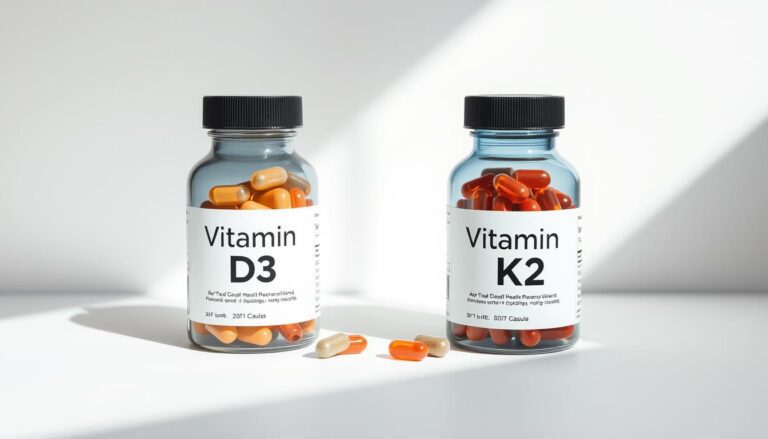Calcium, Magnesium & Zinc: Unlock the Benefits You Need
Table of Contents
Your body needs essential minerals to stay healthy. Calcium, magnesium, and zinc are key nutrients. They help your body work well. Calcium and magnesium are needed more, but zinc is required in small amounts.
Learning about these minerals helps you make better food choices. Each one does something special for your body. This guide will show you how they help keep you healthy and full of energy.
Discovering the importance of these nutrients can change how you eat. It doesn’t matter if you’re into sports, health, or just want to feel good. Knowing about calcium, magnesium, and zinc can make a big difference in your diet.
Key Takeaways
- Calcium, magnesium, and zinc are vital for overall health
- Each mineral serves unique functions in the body
- Proper mineral intake supports multiple body systems
- Nutrition plays a crucial role in mineral absorption
- Understanding mineral interactions can improve wellness
Understanding Essential Minerals for Optimal Health
Your body is a complex machine that needs essential minerals to work well. These tiny nutrients are crucial for your health, helping with bone strength and cell functions. Knowing how they work can help you choose better foods and care for your health.
How well your body absorbs nutrients is important. Not all minerals are the same, and many things can affect how well you use them.
Critical Roles in Body Functions
Essential minerals are key for many body functions. They help your body work smoothly, even though you might not notice it:
- Regulate nerve signaling
- Support muscle function
- Maintain healthy bone structure
- Boost immune system response
- Aid in energy production
Daily Mineral Requirements
Your body needs different amounts of minerals based on your age, gender, and health. Here’s a quick look at how much you should get each day:
| Mineral | Daily Recommended Amount |
|---|---|
| Calcium | 1000-1300 mg |
| Magnesium | 310-420 mg |
| Zinc | 8-11 mg |
Maximizing Nutrient Absorption
Getting minerals into your body is just the start. Nutrient absorption depends on your diet, health, and how you take these minerals. Some nutrients work better together, while others can block absorption.
Eating the right foods and knowing your body’s needs can boost mineral benefits. Talk to a healthcare expert to create a nutrition plan that fits you.
The Power of Calcium for Strong Bones and Beyond
Calcium is a superhero mineral that does much more than just support your bone health. While most people know calcium keeps bones and teeth strong, this essential nutrient plays a critical role in multiple body functions.
Your skeletal system relies on calcium throughout your entire life. During childhood and adolescence, calcium helps build peak bone mass. As an adult, it maintains bone density and prevents conditions like osteoporosis. Approximately 99% of your body’s calcium is stored in bones and teeth, making it fundamental for structural strength.
- Supports bone density and strength
- Prevents age-related bone loss
- Critical for childhood growth
Beyond bone health, calcium performs several surprising tasks. It helps regulate heart rhythm, enables muscle contractions, transmits nerve signals, and supports blood clotting. These functions show why maintaining proper calcium levels is crucial for overall wellness.
Different life stages require varying calcium intake. Children and teenagers need more to support rapid growth, while older adults benefit from consistent calcium consumption to protect against bone deterioration.
Your body cannot produce calcium, so getting enough through diet or supplements is essential for long-term health.
To maximize calcium absorption, pair calcium-rich foods with vitamin D. This combination ensures your body can effectively use this powerful mineral for optimal bone health and beyond.
Magnesium’s Critical Role in Body Functions
Magnesium is a key mineral for your health. It’s called the “master mineral” because it helps in over 300 body functions. Knowing its many roles shows why keeping enough magnesium is vital.
Energy Production and Metabolism
Your body needs magnesium to turn food into energy well. This mineral activates enzymes for cell metabolism, giving you energy for the day. It also helps with:
- Keeping blood sugar levels right
- Helping make proteins
- Working enzymes
Muscle and Nerve Function
Magnesium is key for muscle and nerve work. It helps muscles move and relax, avoiding cramps. It’s great for athletes, helping muscles heal and preventing injuries.
Sleep and Stress Management
Magnesium helps manage stress and sleep. It calms the nervous system, improving sleep and lowering anxiety. Studies show it’s good for those with restless leg syndrome or insomnia.
Zinc’s Impact on Immune System and Growth
Zinc is a key mineral for your body’s health. It supports your immune system and helps with important body functions. Zinc is more than just a supplement; it’s essential for your body to work well.
Your immune system needs zinc to function at its best. Studies show zinc helps create and activate immune cells like:
- Neutrophils
- B cells
- Natural killer (NK) cells
- T cells
With enough zinc, your body fights off infections better. Zinc controls immune responses, lowers inflammation, and boosts your defenses. Without enough zinc, you’re more likely to get sick.
Zinc is also key for cell growth and healing. It helps with:
- Wound healing
- DNA synthesis
- Protein production
- Collagen formation
Zinc also keeps your senses sharp, helping you taste and smell. For men, it supports healthy testosterone and reproductive health.
Zinc acts as a co-factor for over 300 enzymes, making it indispensable for numerous biochemical reactions in your body.
Getting enough zinc through food or supplements boosts your health and happiness.
Calcium, Magnesium & Zinc: Synergistic Benefits
Your body is a complex network where minerals work together for optimal health. Calcium, magnesium, and zinc are not just individual nutrients. They are powerful allies that work better together when balanced correctly.
Understanding how these minerals interact can unlock incredible health benefits. Their relationship is more than just nutrition. It creates a comprehensive approach to wellness that supports multiple body systems.
Combined Effects on Bone Health
The combination of calcium, magnesium, and zinc is crucial for strong bone health. These minerals work together to:
- Strengthen bone density
- Support bone mineral formation
- Enhance calcium absorption
- Reduce bone breakdown
Optimal Ratios and Balance
Achieving the right balance is key to maximizing the benefits of these minerals. Each mineral affects the absorption and effectiveness of the others. This makes their relationship intricate and essential.
Nutrition experts suggest consuming these minerals in specific proportions for the best results. A balanced intake can help:
- Improve muscle function
- Support immune system
- Regulate sleep patterns
- Manage stress responses
Tip: Consult a healthcare professional to determine the best mineral ratios for your individual needs.
Signs of Mineral Deficiency and Risk Factors

Spotting mineral deficiency early is key to keeping your health on track. Your body gives clear signs when it’s missing important minerals like calcium, magnesium, and zinc.
Each mineral deficiency has its own set of symptoms. Knowing these signs is the first step to improving your diet.
Common Signs of Mineral Deficiencies
- Calcium Deficiency Indicators:
- Weak bones and increased fracture risk
- Dental problems
- Muscle cramps
- Irregular heartbeat
- Magnesium Deficiency Symptoms:
- Chronic fatigue
- Muscle weakness
- Mood disorders
- Difficulty sleeping
- Zinc Deficiency Warning Signs:
- Slow wound healing
- Weakened immune system
- Loss of taste or smell
- Hair loss
Some groups are at higher risk for mineral deficiency. This includes people with chronic illnesses, those on special diets, and the elderly. Certain health issues and medications can also affect how well your body absorbs minerals.
If you’re experiencing ongoing symptoms, see a doctor. They can run tests to find out which minerals you’re lacking. Then, they’ll suggest ways to get them back into your diet.
Natural Food Sources and Dietary Considerations
Finding the right foods for calcium, magnesium, and zinc can change how you eat. Your diet is key to getting enough minerals from natural and fortified foods.
Plant-Based Sources of Essential Minerals
Plant-based foods are packed with minerals for those who care about their health. Here are some top picks:
- Leafy Greens: Kale and collard greens are rich in calcium
- Legumes: Chickpeas and lentils are good for magnesium and zinc
- Nuts and Seeds: Almonds and pumpkin seeds are full of minerals
Animal-Based Mineral Sources
Animal products are also great for getting minerals, especially if you eat them:
- Dairy products have lots of calcium
- Fish with bones are a good source of calcium
- Lean meats have zinc and magnesium
Food Fortification Strategies
Food fortification is a smart way to boost mineral intake. Many foods now have extra minerals to meet nutritional needs.
| Fortified Food | Mineral Added | Typical Quantity |
|---|---|---|
| Plant Milk | Calcium | 300 mg per cup |
| Breakfast Cereals | Zinc | 15% Daily Value |
| Orange Juice | Calcium | 350 mg per serving |
By mixing plant-based foods, animal products, and fortified foods, you can get more minerals naturally. Talking to a nutritionist can make your diet even better for you.
Supplementation Guidelines and Best Practices

When looking at dietary supplements for calcium, magnesium, and zinc, knowing how to use them right is key. Your body needs these minerals in the right amounts. Taking them correctly helps you get the most health benefits.
Choosing the right dietary supplements involves several key considerations:
- Select high-quality supplements from reputable brands
- Check the form of minerals for better absorption
- Consider your individual health needs
- Consult with a healthcare professional before starting any supplement regimen
Nutrient absorption can be dramatically improved by following specific guidelines:
| Mineral | Best Absorption Practice | Recommended Timing |
|---|---|---|
| Calcium | Take 500-600 mg at a time | With meals |
| Magnesium | Choose citrate or glycinate forms | Evening or before bed |
| Zinc | Avoid taking with calcium | Between meals |
Be aware of potential interactions between minerals and medications. Calcium can interfere with certain prescription drugs. Always space out your supplement intake and talk to a healthcare provider about your regimen.
Remember, dietary supplements should add to, not replace, a balanced diet. Always try to get nutrients from whole foods first. Use supplements to fill specific nutritional gaps.
Special Considerations for Different Age Groups
Your body’s needs for minerals change a lot as you get older. Knowing these changes can help you eat better and stay healthy.
Childhood and Adolescence
Minerals are key for growing strong during childhood and the teen years. Calcium is especially important for bones and teeth. Teenagers need about 1,300 mg of calcium every day to grow fast.
- Teen boys require 410 mg of magnesium daily
- Teen girls need 360 mg of magnesium daily
- Zinc helps with immune function and healing
- Teen boys need 11 mg of zinc
- Teen girls require 9 mg of zinc
Adulthood Considerations
When you grow up, keeping your bones and muscles strong is key. Adults should get 1,000 mg of calcium each day. They also need 400-500 mg of magnesium.
Pregnancy and Reproductive Years
Pregnancy means your body needs more minerals. Pregnant teens need 1,300 mg of calcium, while older pregnant women need 1,000 mg. You also need 350-400 mg of magnesium for your health and your baby’s.
Older Adults
As you get older, your body absorbs minerals differently. People over 51 might need up to 1,200 mg of calcium daily. Zinc and magnesium needs also change, with different amounts for men and women.
Seeing a healthcare professional can help you figure out the right minerals for your age and health.
Conclusion
Exploring calcium, magnesium, and zinc shows their amazing importance. These minerals are key for your body’s health, from bones to fighting off sickness.
Supplements can fill in nutritional gaps if your diet is lacking. By focusing on these minerals, you’re taking a step towards better health. You can boost your body’s defenses and overall health with the right foods or supplements.
Everyone’s nutritional needs are different. Talking to health experts can help you find the right balance of minerals. By learning and applying these tips, you can improve your health for the long run.
Combining a healthy diet, exercise, and supplements is the best way to stay well. These minerals are your body’s strong allies in keeping you healthy.







